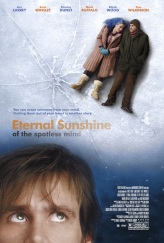| Eternal Sunshine of the Spotless Mind |
| |
 |
USA, 2003. Rated R. 108 minutes.
Cast:
Jim Carrey, Kate Winslet, Kirsten Dunst, Mark Ruffalo, Tom Wilkinson, Elijah Wood, Jane Adams, David Cross, Thomas Jay Ryan
Writers: Charlie Kaufman (screenplay & story), Michel Gondry (story), Pierre Bismuth (story)
Original Music: Jon Brion
Cinematography: Ellen Kuras
Producers: Steve Golin, Anthony Bregman
Director: Michel Gondry
LINKS
|
 he Auteur Theory of cinema posits, rather pretentiously, that only those filmmakers who imprint their personal vision on every frame of a film are worthy of the label of true artists, or auteurs. Since the director is the person most directly in control of a film, auteurs are almost always directors, with obvious examples being Alfred Hitchcock, Woody Allen, and Martin Scorsese. Their films have a specific feel and tone that we can readily identify.
he Auteur Theory of cinema posits, rather pretentiously, that only those filmmakers who imprint their personal vision on every frame of a film are worthy of the label of true artists, or auteurs. Since the director is the person most directly in control of a film, auteurs are almost always directors, with obvious examples being Alfred Hitchcock, Woody Allen, and Martin Scorsese. Their films have a specific feel and tone that we can readily identify.
The Auteur Theory does not generally allow for screenwriters (who do not also direct) to be auteurs. The Auteur Theory will have to make room for screenwriter Charlie Kaufman.
Regardless of who is directing, every Charlie Kaufman script—Being John Malkovich and Adaptation, for example—bears his unique stamp (or, to continue the unnecessary use of pretentious words, his imprimatur). Even the one Kaufman has disowned due to differences with director George Clooney (Confessions of a Dangerous Mind) is unmistakably his work. Kaufman's screenplays are much more than a starting point for a film. Kaufman is the sole architect of his movies. Everything—the acting, the direction, the editing—flows from the script. It doesn't matter who Kaufman's collaborators are, or how much latitude they have. Kaufman screenplays still grow up to be Kaufman films.

Kate Winslet and Jim Carrey in Eternal Sunshine of the Spotless Mind. |
Kaufman is the master of externalizing the internal world of his protagonists, which he accomplishes through such devices as complex voiceover and elaborate imaginary sequences. Kaufman is always poking fun at his characters' foibles—foibles that we usually can recognize in ourselves—but he empathizes with them at the same time. His screenplays are always ironic, amusing, and unpredictable, and what he puts on the screen should rarely be read literally. Like Kaufman's previous stories, therefore, Eternal Sunshine of the Spotless Mind is a wildly inventive exploration of a man's psyche. Half the film, which takes its title from the Alexander Pope poem “Eloisa to Abelard,” takes place inside the protagonist's head.
The premise is simple, even silly. Lined up chronologically, the story is this: Joel (Jim Carrey) discovers that ex-girlfriend Clementine (Kate Winslet) has had her memories of him erased through a medical procedure invented by Dr. Howard Mierzwiak (Tom Wilkinson). In anger and desperation Joel contacts the good doctor and his staff (Mark Ruffalo, Elijah Wood, and Kirsten Dunst), demanding to have his own memories of Clementine erased. However, as Joel lies trapped in a lucid dream with the procedure well underway, he has a change of heart.
Of course, the story is not lined up chronologically. Kaufman introduces us to Joel after the procedure is already complete, as he meets Clementine for what they both think is the first time. Then the film works backward. During the procedure itself, Kaufman probes every dimension of Joel and Clementine's relationship, bouncing around temporally like an LSD-enhanced version of Two for the Road (the great 1967 relationship study with Audrey Hepburn and Albert Finney). We see the initial attraction two people can feel for one another, despite rather extreme differences. We see how the differences that initially attract cause problems later. We see the depressing ordinariness that long-term relationships can sink into, as well as the lingering resentments betrayed by offhanded remarks like, “Do you really think you could take care of a child?” We see the fights that can occur over trivialities like hair on soap in the shower. And underneath all that, we see love.
A common relationship dynamic is for one party to fall into the role of the Responsible One. Joel and Clementine are no different. The twist is that Carrey plays the Responsible One, while Winslet plays the outrageous, unpredictable character. Surprisingly, both actors are extremely effective cast against type. Winslet's talents are well-known, but we don't often see her playing contemporary characters who dye their hair all the colors of the rainbow. She's just as entrancing as she is in corsets.

Kate Winslet and Jim Carrey wake up on a snowy beach in Eternal Sunshine of the Spotless Mind. |
Carrey, on the other hand, is a revelation. He is credibly taciturn and introspective, and although there are some Jim Carrey moments (when he tries to hide his memories of Clementine amid his memories of childhood), they serve the story. Kaufman, being Kaufman, has given Carrey the benefit of voiceover to communicate with the audience, which makes up for any weaknesses Carrey may have as a dramatic actor—not that any weaknesses are in evidence. The sublime supporting cast also strengthens the film. Mark Ruffalo (as a bizarre computer geek with a pompadour) and Elijah Wood (as a hobbit-like interloper who tries to replace Joel as Clementine's boyfriend) establish a strong rapport. Kirsten Dunst is, well, Kirsten Dunst, and Tom Wilkinson…the perfect character actor, as always.
Michel Gondry, who previously collaborated with Kaufman on Human Nature, is a natural director for this material. A wildly creative music video director who has worked in particular with Bjork and the White Stripes, Gondry's extravagant visual landscapes have been consistently described as groundbreaking and visionary. Gondry brings a lot to Eternal Sunshine with his ingenious and expressive realizations of Joel's imaginary tableaus. A music video director must nevertheless be strictly faithful to the material he is given. He cannot alter it to make it more to his liking as a movie director can. Rather, he must be the perfect accompanist, which makes Gondry the perfect accompanist to Kaufman, who stayed involved with Eternal Sunshine through production and post, and served as an executive producer. Though it bears Gondry's strong influence, Eternal Sunshine remains Kaufman through and through, and Gondry's story credit should not be given too much weight. What happened was that, over dinner, Gondry and his friend Pierre Bismuth came up with the premise of someone erasing someone else from their memory. The rest is Kaufman.
It may not occur to some people that Eternal Sunshine is a science-fiction film, but that's what it is. It's the best kind of science fiction—the kind that uses imaginary or hypothetical situations to pursue universal truths. Philip K. Dick, an indefatigable explorer of the nature of identity and consciousness, would have been proud to call this story his own. However, the film Eternal Sunshine is most reminiscent of, thematically and even structurally, is Dark City. The two films are nothing like each other from an experiential standpoint, but Dark City probed the same links between memory, identity, and love. If you somehow forgot you ever knew your lover and met her for the first time today, would you be drawn to her? Can you do away with an emotion by doing away with a memory? Does the memory create the emotion, or does the emotion exist independently? We suppress memories all the time, in the unconscious effort to rid ourselves of pain. It doesn't work, and even if we could rid ourselves of pain so easily, should we want to? Our emotions, good and bad, make us who we are.
Kaufman's previous screenplays have always been intellectually rigorous, but you wouldn't necessary say they have a lot of passion. For all their wit, they are cerebral movies. Eternal Sunshine of the Spotless Mind is different. It's a love story. It's just as cerebral as the others, but it has a tremendous heart. That's what separates it from the rest, making it a masterpiece that will most certainly never be forgotten…or erased.
[Read the AboutFilm profile and interview with Kate Winslet]
[Read the AboutFilm interview with Jim Carrey]
[Read the AboutFilm interview with Elijah Wood]
Review
© March 2004 by AboutFilm.Com and the author.
Images © 2004 Focus Features. All Rights Reserved.



